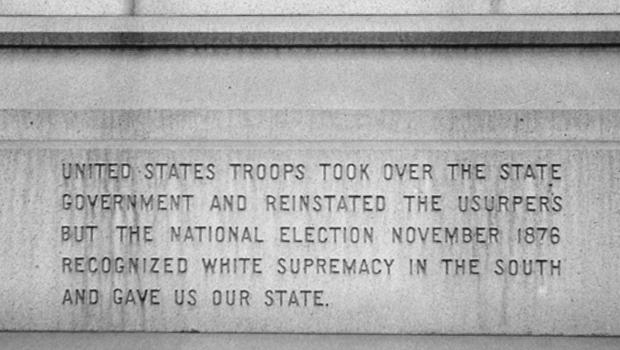It seems WorldNetDaily is not done misunderstanding why monuments to the Confederacy are being removed. Brent Smith first uses his May 22 column to throw out the distraction of Robert Byrd:
When I heard that these and many other monuments were being taken down for the same reason, the first thing that came to mind was the late Democrat icon Robert “Sheets” Byrd (hat tip Rush). He was, of course, a long time U.S. senator from West Virginia, but also a member of the Ku Klux Klan. And not just any member – he was a recruiter, a Kleagle.
Yet Byrd has dozens upon dozens of hospitals, parks, office buildings, community centers, federal buildings, etc. that bear his name. No one says a word about that. Of course not. He was a good liberal.
When asked, Democrats merely state that the racist Byrd should be judged on the entirety of his career – his full body of work – not just his years in the Klan.
Smith conveniently omits that Byrd repeatedly apologized for his KKK affiliation, to the point that even the NAACP praised him for supporting a civil rights agenda. Smith offers no evidence that Lee, Beauregard, et al, ever apologized for their Confederate affiliation.
After unfairly maligning Byrd, Smith then complains that Confederate Gen. P.G.T. Beauregard was being unfairly maligned:
In fact Beauregard was not a racist. A native of New Orleans, he fought for the Confederacy because they were the home team, for want of a better term. It was well-known that he hated Confederate President Jefferson Davis – so much so that he refused to lead Davis’ funeral procession.He was an equal-rights advocate and led the failed unification effort in New Orleans, bringing together both white and black leaders. He fought for voting rights for blacks, integrated schools, public places and public transportation, many decades before national talk of civil rights.
In a speech in 1873, Beauregard said: “I am persuaded that the natural relation between the white and colored people is that of friendship. I am persuaded that their interests are identical; that their destinies in this state, where the two races are equally divided, are linked together; and that there is no prosperity for Louisiana which must not be the result of their cooperation.”
But as the article Smith links to to support his claims about Beauregard admits, the statue of Beauregard that was taken down in New Orleans did not honor his post-Civil War work; it honored his stint as a Confederate general.
Meanwhile, Joseph Farah does what he does in his May 29 column: portray the removal of Confederate statues as some sort of liberal conspiracy:
First, you will notice that Democrats are nearly always at the forefront of this kind of activity.
Why would that be?
Could it be because they are embarrassed and ashamed of their party’s own history?
You see, Jefferson Davis, the only president of the Confederacy, was a Democrat. In fact, for 50 years after the War Between the States, the white South was dominated almost entirely by the Democratic Party. White Democrats ran the South during the war, through the Jim Crow days of segregation and right up until the early 1960s.
Not a single Democrat in that era ever suggested destroying statues of Confederate heroes, taking down Confederate flags or toppling monuments memorializing the Confederacy.
What’s more, the Ku Klux Klan would have discouraged such demolition. And the Ku Klux Klan was the military arm of the Democratic Party.
As we pointed out when Farah made a similar claim, the KKK was not the “military arm of the Democratic Party”; while many angry Southern whites during the 1860s and 1870s were Democrats and a smaller number of them joined the KKK, that doesn’t make the KKK a Democratic creation.
This time around, though, Farah surprisingly concedes that today’s Democratic Party is not the one of 150 years ago. Of course, that’s a conspiracy too, he writes: “It was President Lyndon Baines Johnson who got the idea of the Democrat [sic] Party becoming the ‘champion’ of black Americans by enticing them into dependency through welfare-style programs.”
Farah doesn’t explain why no conservatives hike him are endorsing removal of Confederate monuments and, to the contrary, seem to be opposing it: As we’ve pointed out, the South has always been conservative; many Southerners started abandoning the Democratic Party starting in the 1960s after it supported integration and other equal-rights laws and shifted their allegiance over a generation from Democrats to Republicans.
